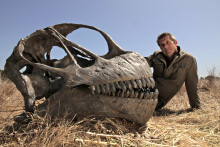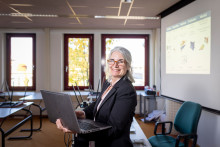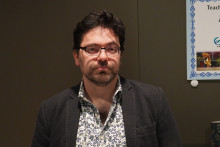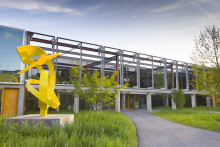Iain Stewart
Professor Iain Stewart is a Scottish geologist and a presenter of a number of science programmes for the BBC, such as Earth: The Power of the Planet (2007). He currently works at Jordan-UK El Hassan bin Talal Research Chair in Sustainability at the Royal Scientific Society in Jordan. He is a UNESCO Chair in Geoscience and Society and formerly a member of the Scientific Board of UNESCO's International Geoscience Programme. His research interests are in natural hazards, sustainable geoscience, and earth science communication. He has collaborated with BBC television presenting many geoscience programmes and recently was academic advisor on Sir David Attenborough’s acclaimed BBC series ‘Seven Worlds, One Planet’.
What is your connection to the Faculty for Geo-Information Science and Earth Observation (ITC) and the University of Twente?
Stewart: ‘I’ve known about ITC for a long time, they are very famous for remote sensing. In the last couple of years, three people I know have joined the faculty. Everyone was starting to come here, so I thought this would be the perfect time to visit. Secondly, at my institute, we are looking into using remote sensing to address environmental disaster risks, and so it felt like a good strategic moment to come to ITC and see what they do here and if there is an overlap with our activities. I see potential for more direct collaboration in the future.’
Seminar at ITC
ITC Centre for Disaster Resilience is hosting the seminar ‘Selling Planet Earth: Communicating Geoscience for Society’ by Professor Iain Stewart. It will take place (in a hybrid form) on Friday, 11th of March, from 15:30 - 17:00 in the ITC Auditorium. The seminar can also be followed online via this link: https://vimeo.com/event/1907887
Why is your lecture titled ‘Selling Planet Earth’?
‘I have spent last two decades selling planet Earth on television, making documentaries. In essence, I have been busy with marketing for the planet. If we can get better at communicating some of the big environmental issues, we can be more effective in persuading people to take action. Many people, especially scientists, don’t like the idea of marketing, but marketing isn’t just selling toothpaste. For them it’s something that should not be mixed up with science, but the principals of marketing are about the relationship between the organization and its customer base. You can switch that to the relationship between the university and the public. If you can be better at strategic parts of marketing, you can be better in overall communication. So the word ‘selling’ is very deliberate. When scientists start talking about communication, they don’t like the idea of being a marketeer, they see science as a more pure endeavour. My point is: Let’s get real. Accept that’s what we do and get better at it.’
Do you have any tips on how to get better at it?
‘The assumption is that people don’t have enough knowledge and our job is giving them knowledge. The thing is, people don’t make decisions based on facts and knowledge. They make decisions based on gut feelings, based on emotions, and that is not the plane we communicate on. That is why a lot of communication doesn’t hit its mark. People often ask me for fast tips and tricks on how to improve their writing and presentation, but it is primarily about thinking of your audience. You need to know who your target audience is. Scientists usually reply ‘general public’, but that is often not the case. Secretly, many scientists just want their research funders to see, to give them extra credit. They don’t really think of their audience.’
‘Empathy is a big part of the equation’
‘The urgency of current problems related to climate change means that we are expected to engage with local communities who are directly impacted. This brings a whole bunch of communication skills that have nothing to do with presentation and journalistic skills. Empathy is a big part of the equation. Too many researchers come with the attitude ‘I’m the expert. I will tell them what to do, they will listen to me and do it.’ That of course goes very badly. That is why I apply a layered approach. I like to take the strategic bits of marketing – think of what is your brand, what is your core message, how do you communicate it internally and to your key stakeholders. Essentially: be a good communicator, know your audience and be more inclusive in your approach.’

You studied geology, but at a certain point you switched to geo-communication. Why was that?
‘When I was teaching geology, I loved standing in front of the class, the performance of it. Television was an opportunity to do this at a larger scale. At the time, late 1990’s, there was nothing on TV about my field, so we had the whole landscape to ourselves. The advantage I had was that people were very unfamiliar with the subject, it was all new for them. People often think that geology is just about rocks, but there is so much more – earthquakes, volcanos, dinosaurs. In fact it is four and a half billion years of stories about the planet. And most people don’t know any of these stories. The stories are unfamiliar and stories are what drives the whole thing.’
‘Weirdness rocks’
‘On top of that, geologists are a weird folk, but weirdness rocks. Just think about it: a geologist goes to some obscure place, picks up a rock, puts it in his backpack, carries it to the lab, crushes is to powder, and puts it in a machine. That is weird! But weirdness is a good thing. It intrigues the audience. Then geologists can explain why they do all this and it becomes fascinating.’
When it comes to science communication, what are the main mistakes that you have observed?
‘The overall one is this deficit thinking, which assumes it’s about a lack of knowledge. Secondly, there is this fixation with information overload. Scientists often try to impress everyone with a lot of data. They think the more data they share, the better, but it should be about basic story telling. Scientists get nervous about taking out information, they feel they dumb it down, but the content they originally created is probably intended for like ten people out of the hundred in the room. You need to think of these other ninety people. Yes, we need facts, but is not only about facts, it is about the narrative. Whoever controls the narrative, has all the power.’
Who should come to your lecture tomorrow? Who do you think will benefit the most from it?
‘I really want to reach early career academics. The younger generation is very media savvy. There is a real chance to bring this skillset to science. The paradox is that the young people’s supervisors are not in that world, and so they cannot offer their expertise. If you can harness these media skills better, it will be better for science. It could help bring science to people in a much more efficient way.’







